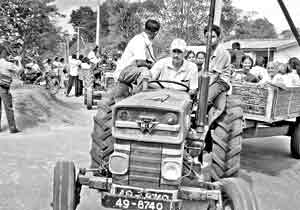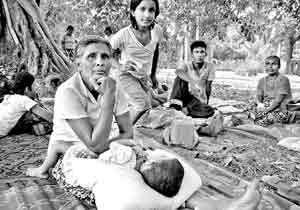
Emergency laws to curb LTTE weapons purchases
Even if it sounded somewhat innocuous, the new Emergency Regulations promulgated last Monday appeared significant. Regulations gazetted by President Mahinda Rajapaksa under the ongoing State of Emergency seek to prohibit the procurement of a variety of weapons by Sri Lankans. Laws relating to this, particularly the Dangerous Weapons Ordnance, have remained in the statute book for many decades. But, this time the new regulations requires that "no person who being a Sri Lankan national, whether resident or outside Sri Lanka, shall procure or cause to be procured, aid or abet the procurement of, or provide financial assistance for the procurement of, military equipment." Such acts will be deemed to be an offence. Those suspected will be liable for arrest and detention. This is until they are tried by a High Court in Colombo. Thus, the new regulation seeks to rope in Sri Lankans living abroad against whom they have evidence of any form of complicity in weapons procurements. A Defence Ministry source said the new regulations will empower the Police or the Security Forces to arrest them. They would be placed under detention after an order is obtained from the Secretary to the Ministry of Defence. The source said until now the laws did not cover particularly those Sri Lankans living abroad who were helping the Liberation Tigers of Tamil Eelam (LTTE) to procure weapons through various means. "Now, if they return, the law is on hand to deal with them," the source said. The identities of several Sri Lankans have surfaced following investigations by law enforcement agencies in different countries. They include United States, France, Italy, Thailand and Cambodia. The schedules of prohibited items in last Monday's Gazette notification are grouped into four categories. The first are all types of military switches used for booby traps and Improvised Explosive Devices (IED) and ISF Electric and ISF Percussion Igniter Switches. The second category are all types of Weapons Systems/Weapons/Ammunition. They have been listed as 81 mm Mortar, 82 mm Mortar, 60 mm Mortar, 40 mm Rocket Propelled Grenades, 40 mm Grenade Launchers, All types of Machine Guns, All types of automatic rifles, Pistol, All Type of Fire Arms, All types of Artillery, Naval and Air Defence Guns, Anti-aircraft guns and accessories, All types of missiles/rockets, All types of grenades, All types of Armoured Vehicles, Naval ships and Military aircraft.
The third category: All types of radars and radar spares, All type of parachutes, Night Vision Devices and Beta Lights. The fourth category: Armoured vehicle spares, Submerged Vehicles or under water vehicles, Explosive detection equipment, Digital jamming devices, Infra-red illuminations, GPS equipment inclusive of Aviation GPS and laser designators. Three other items will be subject to Ministry of Defence approval. They are Laser Range Finders, Radar Range Finders and Thermal Image Devices. Note: Though GPS devices have been prohibited, such systems are now liberally incorporated into mobile and even satellite phones. In addition, GPS devices are sold in the open market in many countries and are used for navigation purposes. The regulations empower the Secretary, Ministry of Defence "in the national interest" to prohibit items which in his opinion are "similar to, or resemble very closely, in its appearance," the items that have been banned. He has also been empowered to enlarge the list of items if he feels it is in "the interest of national security" to do so. Those contravening the regulations are to be tried in a High Court that will convene in Colombo. They will be liable for rigorous imprisonment for a term not less than three months and not exceeding five years and to a fine of not less than Rs 500,000. The new regulations come at a time when there is increased international attention being focused on Sri Lanka. The Government has turned down requests from two leading UN dignitaries who are paying separate visits to Colombo to travel to Kilinochchi. This is for meetings with LTTE leaders. Arriving on Monday will be John Holmes, head of the Office for Co-ordination of Humanitarian Affairs. He will be followed by Louise Arbor, UN High Commissioner for Refugees, in the first week of October. The Government's inability to allow them to travel to Kilinochchi has already been conveyed to them. Officially the Government has taken up the position that such visits would only confer "undue recognition" to the LTTE. Government will fly the two visitors to both Jaffna and Batticaloa. Co-inciding with the visit of Mr. Holmes is a damning report on Sri Lanka due to be released by the New York based Human Rights Watch on Monday. Mr Holmes, who succeeded Norwegian Jan Egeland, was one time a key advisor to then British Prime Minister, Tony Blair. He is due to meet President Rajapaksa, Human Rights Minister Mahinda Samarasinghe and Foreign Minister Rohitha Bogollagama among others during his four day visit. Sri Lanka also figured at the US Congress last Wednesday when their Sub Committee on the Middle East and South Asia discussed the political crisis in the region. Some of the remarks made by Steve R. Mann, Principal Deputy Assistant Secretary of State for South and Central Asian Affairs, set out the US Government position. Some relevant excerpts: "Sri Lanka's long-standing ethnic conflict, fragile peace process, and deteriorating human rights conditions continue to cause concern for the United States and the international community. The conflict between the Sri Lankan Government and the Liberation Tigers of Tamil Eelam entered a phase of intensified fighting during President Rajapaksa's administration. In recent months, fighting has been steady in the Tamil Tiger-controlled East as Government forces attempted to re-take areas held by the Tigers under the terms of the 2002 Ceasefire Agreement. On July 11, 2007, the Sri Lankan military announced it had taken Thoppigala, the last remaining Tamil Tiger stronghold in the East, bringing the entire Eastern Province under government control. The costs of war have taken a heavy toll on the economy: inflation currently stands at 20% and tourism one of Sri Lanka's main industries - has plummeted by 40-60% since last year. "Fighting continues in the North and there is a continued Tiger presence in the East. Just five days after the government announced it was in control of the East, suspected Tiger gunmen shot and killed a senior provincial administrator. The Tigers remain a considerable fighting force and are capable of launching attacks across the island. On July 25, the Tigers detonated a claymore mine in the North, killing 11 soldiers and wounding eight others. "Prospects for peace are currently focused on an effort by the President's party, the major opposition parties, and other parties to finalise a proposal which would reform the constitution to create a system devolving certain powers to Tamil and other minority areas. The peace process in Sri Lanka has collapsed repeatedly in part due to a lack of political consensus over how to satisfy the rights and aspirations of the majority Sinhala and minority Tamil populations. It is critical that the country's political leadership engage fully and in good faith in the current debate over devolution of power and place the best interests of the country ahead of partisan politics. I must flag the fact that the Tamil Tigers share the responsibility for the negotiation impasse. It is important to note as well that although the Tigers are a party to the negotiations, they cannot be considered to be the representatives of all Sri Lankan Tamils. "Our top policy priorities for Sri Lanka remain restoration of good governance and respect for human rights leading to an eventful negotiated settlement. We believe that finalising a credible devolution of power proposal, together with ending human rights violations and improving government accountability, are essential steps towards a lasting peace. The government of Sri Lanka must do more to provide security and equitable treatment for its citizens, including taking seriously the plight of internally displaced persons, creating the conditions to allow economic opportunities to return across the island, and ensuring fair treatment at the hands of the police and security forces. These issues cannot be stably resolved through military means alone…….." Mr. Mann has placed before the Congressional Committee the US Government's current thinking of developments in Sri Lanka. He has noted that the costs of war are taking a heavy toll on the Government. Jane's Defence Weekly has disclosed in a report this week that the Air Force alone wants equipment and other needs totalling US 300 million from July to December this year. The needs of the Army and the Navy are not still known. Naturally, when their requirements are totalled, it would add to billions of rupees or millions of dollars. This is at a time when fuel prices are on the rise. The last increase on July 27 coupled together with increase in milk food prices has already dealt a crippling blow to Sri Lankans. Fears of attacks are driving villagers living closer to guerrilla dominated areas in the Vavuniya district to flee their homes. It is in this backdrop that the military is preparing for its next major onslaught on Tiger guerrilla positions in the North. |
|| Front
Page | News | Editorial | Columns | Sports | Plus | Financial
Times | International | Mirror | TV
Times | Funday
Times || |
| |
Copyright
2007 Wijeya
Newspapers Ltd.Colombo. Sri Lanka. |


